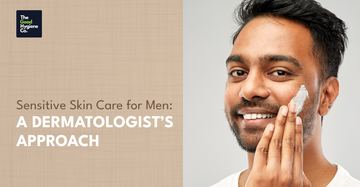For years, skincare was marketed almost exclusively to women. But times are changing—men are realizing that their skin deserves just as much attention, especially when it’s sensitive. Sensitive skin isn’t a cosmetic inconvenience; it’s a condition where the skin reacts strongly to daily triggers such as shaving, pollution, harsh soaps, or even stress.
A dermatologist’s approach to sensitive skin in men is not about adding dozens of products to a routine. Instead, it’s about understanding your skin’s needs, protecting its barrier, and choosing only what truly works. Let’s take a closer look at how experts recommend caring for sensitive skin.
Why Men’s Skin Becomes Sensitive
Dermatologists describe sensitive skin as skin that overreacts to stimuli that wouldn’t normally bother others. For men, some unique factors come into play:
- Shaving irritation – Frequent shaving can cause micro-cuts, razor burn, and ingrown hairs, weakening the skin barrier.
- Oil production – Men’s skin is usually oilier, but when harsh cleansers are used, it leads to imbalance and reactivity. (1)
- Outdoor exposure – Sun, heat, wind, and pollution often affect men more because of outdoor work or sports.
- Simplified routines – Many men stick to “one soap for everything,” which often contains strong detergents and fragrances that trigger sensitivity.
Symptoms of sensitive skin include redness, burning sensations, tightness after washing, flakiness, or breakouts after trying new products.
The Dermatologist’s Daily Routine for Sensitive Skin
A dermatologist-approved routine doesn’t have to be complicated. It just needs to be gentle, consistent, and protective.
Step 1: Gentle Cleansing
Cleansing is essential, but the wrong cleanser can strip away natural oils and worsen sensitivity. Dermatologists recommend a pH-balanced, soap-free cleanser that removes impurities without drying out skin.
Step 2: Hydration and Moisture
Sensitive skin loses water quickly because its barrier is weaker. Replenishing hydration is key to preventing irritation. (2) A lightweight moisturizer works for the face, while a richer cream or lotion supports body skin.
Step 3: Sun Protection
Dermatologists agree that UV rays are the number one external irritant for sensitive skin. Even men who don’t spend much time outside should wear broad-spectrum sunscreen daily. Mineral sunscreens (zinc oxide or titanium dioxide) are usually better tolerated than chemical ones.
Step 4: Shaving with Care
Shaving is often the biggest challenge for men with sensitive skin. To reduce irritation:
- Shave after showering, when hair is softer.
- Use a clean, sharp razor.
- Shave in the direction of hair growth.
- Apply a soothing, fragrance-free aftershave or moisturizer.
Ingredients Dermatologists Recommend
Not every skincare ingredient is safe for sensitive skin. Dermatologists usually guide patients toward soothing and barrier-strengthening actives:
- Aloe vera – Hydrates and reduces redness.
- Ceramides – Repair and strengthen the skin barrier.
- Shea butter – Locks in moisture.
- Chamomile extract – Calms irritation.
- Glycerin – Attracts water into the skin.
On the other hand, dermatologists advise men with sensitive skin to avoid:
- Fragrance and dyes.
- Sulfates (like SLS, SLES).
- Strong alcohol-based toners.
- Harsh scrubs and aggressive exfoliants.
Lifestyle Habits That Matter
Sensitive skin care doesn’t stop at products. Dermatologists often highlight daily habits that make a huge difference:
- Use lukewarm water instead of hot showers to prevent dryness.
- Wear breathable fabrics like cotton to reduce sweat irritation.
- Stay hydrated to keep skin from drying out internally.
- Get enough sleep and manage stress, since cortisol spikes can worsen flare-ups.
- Check labels before trying new products. Patch-testing is key for sensitive skin.
A Dermatologist’s Perspective on Men’s Skincare Myths
There are a few misconceptions men with sensitive skin should know:
- “Men don’t need moisturizer.” False—hydration is essential, especially after shaving.
- “Natural products are always safe.” Not necessarily; some natural oils or botanicals can be irritating.
- “Exfoliating daily will fix rough skin.” Over-exfoliation damages the skin barrier, making sensitivity worse.
When to See a Dermatologist
If you’ve tried adjusting your skincare routine but still struggle with constant redness, flaking, or burning sensations, it may be time to consult a dermatologist. Underlying conditions like eczema, rosacea, or contact dermatitis could be the cause, and they require professional diagnosis.
Building a Dermatologist-Approved Routine
To put it all together, here’s what a dermatologist-recommended routine for men with sensitive skin looks like:
- Gentle face cleanser (morning and night).
- Light moisturizer or serum for the face.
- Hydrating lotion or butter for the body.
- Sunscreen every morning.
- Soothing care after shaving.
At TGHC, our dermatologist-formulated products are designed with these principles in mind. Our Face Foam Wash, Soothing Serum, Body Milk, Body Butter, and Body Rinse are free from harsh irritants, fragrance, and sulfates—making them safe, effective, and calming for men with sensitive skin.
Conclusion
Sensitive skin doesn’t have to mean compromised skin. With the right dermatologist-approved care—gentle cleansing, consistent hydration, smart shaving practices, and daily protection—you can keep your skin strong, calm, and resilient.
And when you choose products crafted for sensitive skin, you’re not just treating symptoms—you’re building long-term skin health.
References:
1. Oily Skin: A review of Treatment Options - 2017 Aug - https://pmc.ncbi.nlm.nih.gov/articles/PMC5605215/#:~:text=sebum%20production%20does%20not%20decline,and%20the%20time%20of%20year.
2. Diet and Skin Barrier: The Role of Dietary Interventions on Skin Barrier Function - 2021 Jan - https://pmc.ncbi.nlm.nih.gov/articles/PMC7875671/#:~:text=The%20physical%20layer%20of%20the,quality%20%5B6%2C7%5D.






